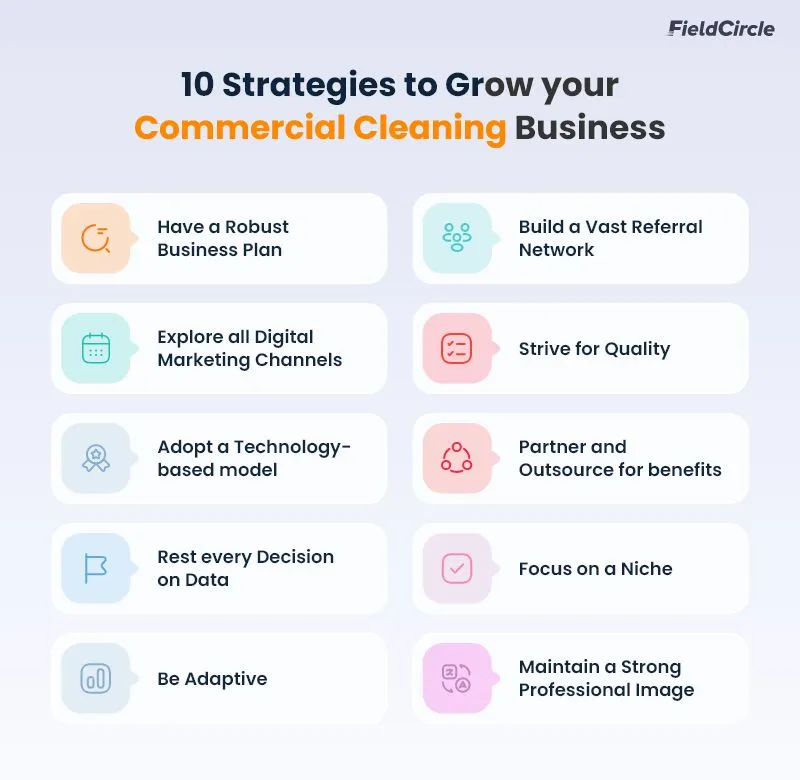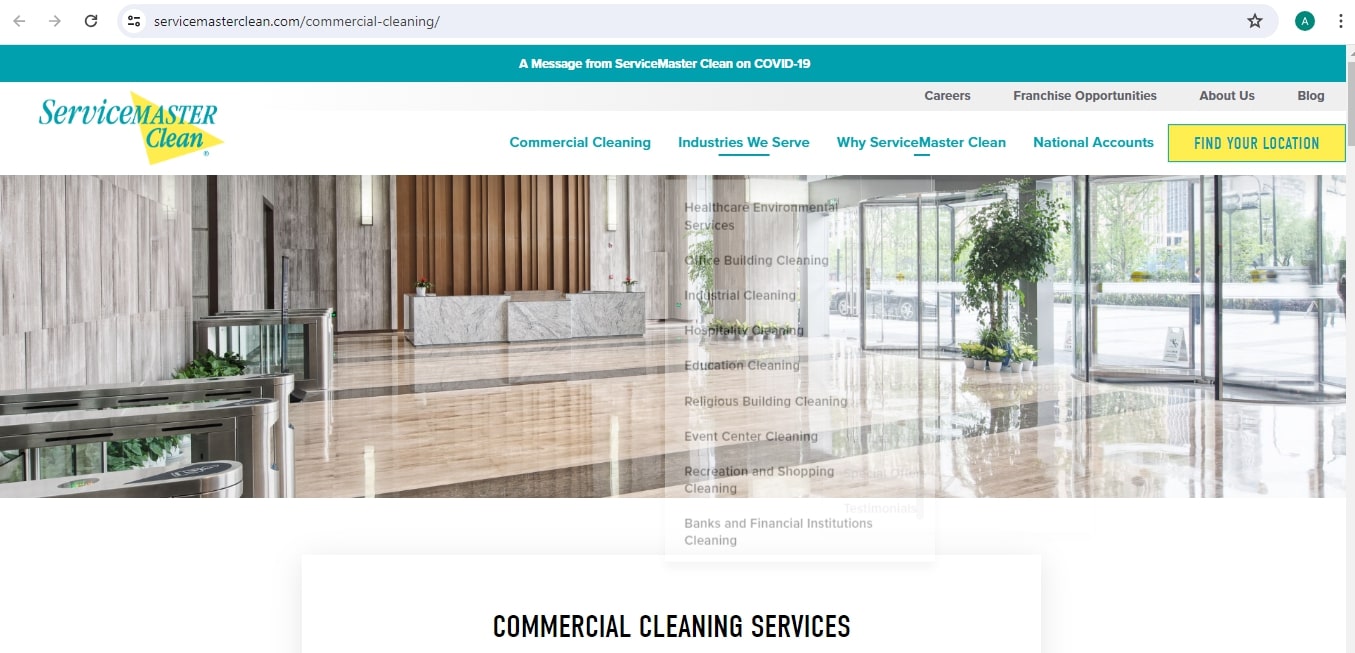How to Drive Growth in Commercial Cleaning: Strategies Cleaning Businesses must follow

The cleaning industry is registering constant growth, as shown by the rising cleaning services market which is projected to reach $476.13 billion in 2028 at a compound annual growth rate (CAGR) of 8.1%. If we talk about the US, the market is expected to grow by 6% by 2030.
The rise in the jobs also holds a proof for a rising growth trend. Employment in the cleaning and janitorial services industry is expected to grow by 6.08% by 2029. The cleaning industry in the US is experiencing above-average job growth at a rate of 10%, which is 3% higher than the national average for all other industries.
Overall, we see a promising future for the industry, which is witnessing an influx of new players, when there are already established names. In this cut-throat competition, as a commercial cleaning business if you set out to carve your identity you need to follow certain proven strategies to become successful in a short span.
So, embrace these strategies that we have brought here and stick to them to build a solid existence.
10 Strategies to Grow your Commercial Cleaning Business

These strategies discussed here work in tandem, so we need not see them as strategies that work individually. They work as a part of your strategy framework, and can be used in combination with other strategies. Read through, embrace and implement them to establish yourself as a leading commercial cleaner.
1. Have a Robust Business Plan
“Every minute you spend in planning saves 10 minutes in execution; this gives you a 1,000 percent return on energy!” These pithy words of Brian Tracy goes well with business planning and commercial cleaning is not left from the fold.
A plan serves as a basic foundational element to steer your cleaning business. By defining clear goals for your business, it lays the foundation for operational efficiency, client acquisition, and long-term business growth. But the planning process cannot be static in nature. There will be a plan at the outset, when you start your business. Every new initiative or transformation program will also have a plan. Ideally, your business plan should be composed of these components:
- Detailed description of the specific cleaning services offered
- Identification of the primary industries or sectors targeted for cleaning services along with an analysis of their specific cleaning needs and preferences.
- Assessment of local competitors in the commercial cleaning industry, including an analysis of their pricing, services offered, and market positioning.
- Description of the operational workflow, including the cleaning processes, equipment, and supplies needed.
- Strategies for recruiting and training cleaning staff, ensuring they are equipped with the necessary skills and knowledge in cleaning techniques, safety procedures, and customer service.
- Forecast of the startup costs, revenue projections, and profit and loss estimates based on market analysis, pricing strategy, and operational expenses.
- Identification of the licensing, permits, and health and safety regulations required for operating a commercial cleaning business in the area, along with plans for compliance.
- Assessment of potential risks to the business (e.g., liability issues, equipment failure) and strategies for mitigating these risks to ensure business continuity.
2. Build a Vast Referral Network
As a thumb rule, implementing a customer referral program where existing clients are rewarded for referring new commercial clients to incentivize word-of-mouth marketing. However, building a referral network in commercial cleaning is a challenging task as it differs from building a network compared to residential cleaning. The chances of getting references of other commercial prospects from your existing business clients are slim. So, you must explore other channels to expand the reach.
The local chamber of commerce could be a great channel for networking, where enterprises converge to forge alliances. Participating in chamber events, sponsoring local business functions, and volunteering for committees will help raise awareness of your services among fellow business owners.
On similar lines, attending industry-specific networking events, trade shows, and business gatherings will prove to be beneficial. These events provide opportunities to connect with decision-makers in various industries. By tapping into multiple referral streams, you will be able to hedge against dependency on any single source, and have a steady influx of qualified leads.
3. Explore all Digital Marketing Channels
We live in digital times in which digital channels define competition and digital channels help win in the competition. Drawing inspiration from those leading by example is the best thing to follow. Take for instance, ServiceMaster Clean, which has a nice online presence:

Service Master Clean has an informative website which is discoverable over the internet, which means they have been investing efforts on SEO as well, and not just maintaining a web presence.
To get commercial leads, a good online presence is must not only in the form of a website but also across other channels like social media platforms and third-party websites. Make sure that you have a presence on Facebook, Instagram, and Twitter, and regularly engage with your audience via information and feedback. Then use prospecting on LinkedIn to increase your chances of widening your net and eMail marketing to hit specific targets.
Given the tough competition, investing in advertisements is one nice step to take. Besides traditional channels, use search-engine specific advertising strategies to be easily discoverable. This is one low-cost investment that will fetch handsome outcomes in the long-run.
4. Strive for Quality
As the adage goes “great service quality can do miracles”, your service quality will define the long-term success of your business. All your other strategies will be of no use, if you are not maintaining service quality. You should not deliver service only because you have to deliver, but must deliver it keeping quality in mind. So make this delivery process KPI driven by defining these service quality KPIs:
- Client Satisfaction Score: Measures the overall satisfaction of clients, typically gathered through surveys.
- Service Completion Rate: Tracks the percentage of cleaning tasks completed on time and according to the client’s specifications.
- Complaint Resolution Time (CRT): Measures the average time taken to resolve client complaints.
- Employee Productivity (EP): Measures the amount of work completed by cleaning staff within a given timeframe.
- Inspection Scores (IS): Provides a quantitative assessment of cleaning quality.
Feedback is another mechanism to bring improvement in the quality of your service. Use it as an input to the KPI-driven improvement process. Gather feedback from your clients using surveys and regular follow ups, where you ask them to rate your quality and also seek suggestions for improvement.
5. Adopt a Technology-based model
There is no single reason why you should build a strong technology-driven model. If you are the one who thinks that cleaning businesses can thrive without technology or misled by the perception that technology has nothing to do with cleaning, you are moving your business towards a doom.
From efficiency and productivity, and securing competitive advantage, technology does it all to future proof your business and generate new revenue streams. Based in Toledo, Ohio, Next Door has incorporated technology into their operations right from the start. It uses technology for its cleaning services like carpet cleaning, hard tile cleaning, and disinfecting.
With the help of autonomous sweepers, robotic vacuums, and UV disinfection robots, you can heighten the efficiency of your cleaning operations and massively reduce the service time. Based on AI, these automated equipment such as vacuum cleaners come with features like scheduled cleaning and dirt detection and offer consistency in cleaning. Due to their immense potential to transform cleaning operations, the demand for cleaning technology like ultrasonic cleaning has been rising.
As a part of the technology model, you must have mobile apps for task management. These apps will help you take prompt actions for reported issues and bring transparency to the process.
6. Partner and Outsource for benefits
Collaboration is an essential part of business operations. You partner with vendors for reliable access to quality cleaning products and equipment. Then you partner with related companies to outsource some tasks for cost advantage. Additionally, it also benefits you in terms of cross-promotion and fetching new clients. Moreover, partnerships with environmental organizations or green certification bodies boost your credibility and attract eco-conscious clients. Exhibit partnerships across spectrum by collaborating with
- Real Estate Agencies: Partnering with real estate agencies will lead to contracts for cleaning services in commercial properties that are being sold or rented out.
- Property Management Companies: Building relationships with property management companies will result in contracts for cleaning services in residential complexes, office buildings, and other managed properties.
- Office Supply Providers: Partnering with office supply companies will help in cross-promotional opportunities and referrals for cleaning services in office environments.
- Janitorial Supply Companies: Collaborating with suppliers of cleaning equipment and products gives access to high-quality supplies at competitive prices.
- Facilities Management Companies: Partnering with facilities management companies will give access to contracts for comprehensive facility maintenance services, including cleaning, landscaping, and maintenance.
- Local Businesses: Forming partnerships with local businesses, such as restaurants, retail stores, and medical facilities, will result in contracts for regular cleaning services.
- Event Management Companies: Partnering with event management companies will provide contracts for post-event cleaning services in venues and event spaces.
- Environmental Services Providers: Collaborating with companies that offer environmental services, such as waste management or recycling enhances the sustainability aspect of the cleaning company’s offerings.
- Insurance Providers: Partner with insurance companies for cost-effective insurance solutions tailored to the specific needs of cleaning businesses, providing financial protection and peace of mind.
- Community Organizations: As said earlier, build collaborations with community organizations, such as local chambers of commerce or business associations for networking opportunities and referrals for cleaning services.
7. Rest every Decision on Data
The necessity for commercial cleaners to use data for every single decision is underscored by its transformative impact on performance areas. You will see that in your commercial cleaning operations, data will come from many major and minor processes – from customer feedback to automation systems. Use them for cleaning patterns analysis, supply usage monitoring, and monitoring your environmental commitment.
Customer feedback serves as a foundational pillar in the framework of data-driven cleaning strategies. Direct insights provided by customers illuminate areas requiring attention and adjustments in cleaning schedules and you can align your cleaning efforts with user expectations. The American Dream Mall in Miami serves as a compelling example. It used data to synchronize cleaning efforts with foot traffic patterns and prioritize high-traffic areas.
By discerning peak usage times and frequented areas, cleaners optimize resource allocation, so that high-traffic zones remain available during busy periods while conserving resources during quieter times. Data also serves as a pivotal element for introducing new features, such as fragrances or aromatherapy into cleaning routines, as you can meticulously evaluate their impact on customer satisfaction and staff performance in the launch phase.
8. Focus on a Niche
Commercial cleaning covers a broad spectrum of cleaning services. You must be clear on which type of cleaning services make your core forte. To distinguish yourself in the crowd, focus on differentiation.
You might be specializing in catering cleaning services to a specific industry. Make the businesses from that industry hear about your niche. Business clients are more likely to stay with a company that meets their specific needs and offers something they cannot easily find elsewhere.
If you are a provider that caters medical cleaning, then build a strong message and make use of diverse channels as we highlighted earlier to reach out to your customers. Over the period of time, you will be able to build a strong brand identity associated with that niche, and make it easier for your customers to remain with your services.
9. Be Adaptive
Businesses operate in an age when adaptability defines their future. “All failure is the failure to adapt; all success is successful adaptation,” remarked Max McKeown, a renowned strategy consultant.
Traditionally, commercial cleaning focused on basic sanitation and aesthetics. With time this perception changed and began pushing the industry towards more rigorous hygiene protocols and advanced disinfection techniques.
Simultaneously, technological advancements began revolutionizing the commercial cleaning sector. Automation and robotics, such as autonomous vacuum cleaners and scrubbers become a part of the operations. Now, technologists are mulling to bring cleaning within the scope of IoT. Then, green cleaning technologies and eco-friendly products started gaining traction to meet sustainability goals and reduce environmental impact.
There is no fixed scenario within which commercial cleaners can operate. What is relevant today may soon become obsolete – may it be a practice, technology, or an approach. Commercial cleaning companies must therefore depict a high-degree of flexibility, where they are ready to embrace technology.
10. Maintain a Strong Professional Image
Can you survive without a brand in the long-term? Of course not. A brand allows you to reflect your commitment to quality in the market and maintain a healthy existence.
Building a formidable brand for a commercial cleaning business hinges on cultivating an impeccable reputation. Consistently delivering sterling service will lay the cornerstone for a rock-solid reputation. Things like having a good uniform for your staff and a logo adds to the service aspect, and polishes your image.
To manage and maintain your reputation, encourage satisfied clients to offer positive reviews on listing sites like Google My Business and Yelp, and also across different social media platforms. These testimonials are gold dust but play a key role in enhancing credibility and increasing visibility. Take out time to respond to reviews, whether laudatory or critical, so as to demonstrate that you value feedback and are committed to perpetual improvement.
Takeaway
The commercial cleaning industry is transforming to meet contemporary demands for health, efficiency, and sustainability. Cleaning companies that embrace the above-discussed strategies and innovate continuously will be better positioned to meet these demands.
Technology adoption is one critical success lever that commercial cleaners must mull. FieldCircle offers a highly capable cloud-based cleaning software that provides a comprehensive set of all essential functionalities for any janitorial business.
Integrating our cleaning application in your strategy framework will assist you in building each of these strategies and simplify the mammoth task of executing each of them. Learn from our experts how to make this possible and grow your cleaning business with our tool.


